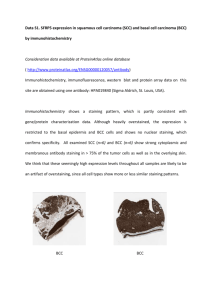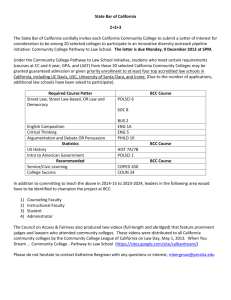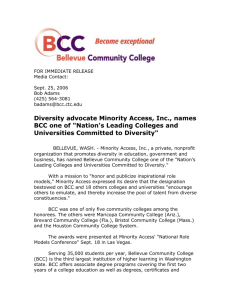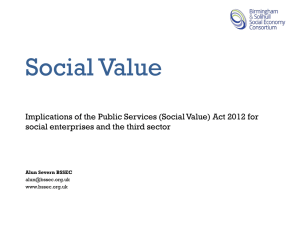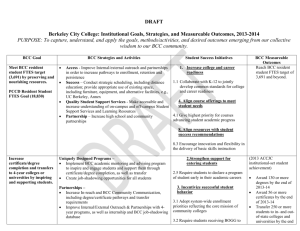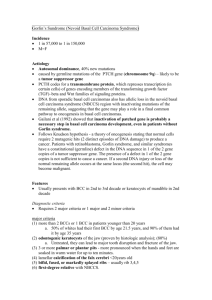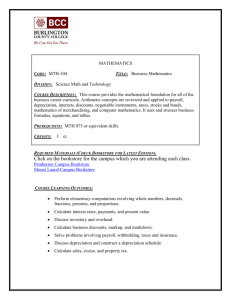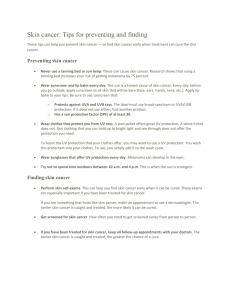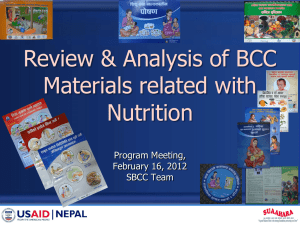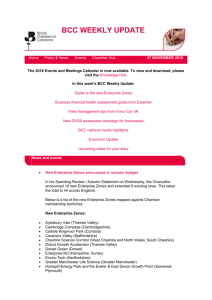Patient information about Basal Cell Carcinoma (BCC)
advertisement
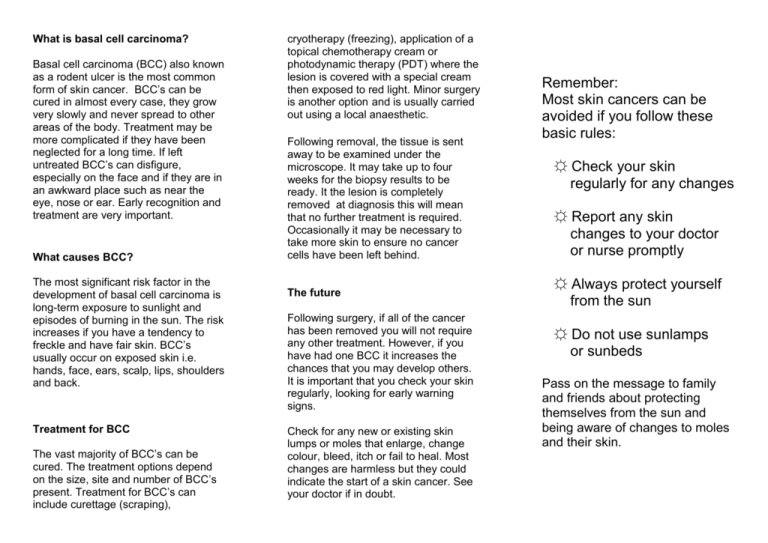
What is basal cell carcinoma? Basal cell carcinoma (BCC) also known as a rodent ulcer is the most common form of skin cancer. BCC’s can be cured in almost every case, they grow very slowly and never spread to other areas of the body. Treatment may be more complicated if they have been neglected for a long time. If left untreated BCC’s can disfigure, especially on the face and if they are in an awkward place such as near the eye, nose or ear. Early recognition and treatment are very important. What causes BCC? The most significant risk factor in the development of basal cell carcinoma is long-term exposure to sunlight and episodes of burning in the sun. The risk increases if you have a tendency to freckle and have fair skin. BCC’s usually occur on exposed skin i.e. hands, face, ears, scalp, lips, shoulders and back. Treatment for BCC The vast majority of BCC’s can be cured. The treatment options depend on the size, site and number of BCC’s present. Treatment for BCC’s can include curettage (scraping), cryotherapy (freezing), application of a topical chemotherapy cream or photodynamic therapy (PDT) where the lesion is covered with a special cream then exposed to red light. Minor surgery is another option and is usually carried out using a local anaesthetic. Following removal, the tissue is sent away to be examined under the microscope. It may take up to four weeks for the biopsy results to be ready. It the lesion is completely removed at diagnosis this will mean that no further treatment is required. Occasionally it may be necessary to take more skin to ensure no cancer cells have been left behind. The future Following surgery, if all of the cancer has been removed you will not require any other treatment. However, if you have had one BCC it increases the chances that you may develop others. It is important that you check your skin regularly, looking for early warning signs. Check for any new or existing skin lumps or moles that enlarge, change colour, bleed, itch or fail to heal. Most changes are harmless but they could indicate the start of a skin cancer. See your doctor if in doubt. Remember: Most skin cancers can be avoided if you follow these basic rules: ☼ Check your skin regularly for any changes ☼ Report any skin changes to your doctor or nurse promptly ☼ Always protect yourself from the sun ☼ Do not use sunlamps or sunbeds Pass on the message to family and friends about protecting themselves from the sun and being aware of changes to moles and their skin. Taking Care in the Sun ☼ Stay in the shade between the Telephone numbers for follow up appointments: ☼ Make sure you never burn. Dermatology 01752 439936 Plastic Surgery 01752 439937/431184 Oncology 01752 763994 ☼ Avoid the use of sun beds. Other sources of information: ☼ Always cover up. Wear light cool clothing of a tight weave, wide brimmed hats and U.V. protective sunglasses. Look for the CE or BS EN 1836:1997 mark on sunglasses as these offer the highest protection. The Mustard Tree Macmillan Centre, Level 03, Derriford Hospital, Plymouth Monday – Friday (Drop in) Tel 01752 763672 hours of 11am and 3pm. ☼ Take extra care of children, their skin is delicate. Very young babies should be kept out of strong direct sunshine. ☼ Use a sunscreen of SPF factor 30and above, according to your skin type, apply it 15-30 minutes before you go outside and re-apply it regularly, every 2-3 hours. Macmillan Cancer Support Freephone: 0808 808 0000 www.macmillan.org.uk Marcs Line (Melanoma and Related Cancers of the Skin) Tel: 01722 415071 www.wessexcancer.org www.nhschoices.uk www.sunsmart.org.uk www.metoffice.gov.uk ruth.devlin@nhs.net jill.daniels4@nhs.net A-132/Onc/Skin/RD/Basal Cell Carcinoma BCC/Skin Cancer Team/2014 Patient information about Basal Cell Carcinoma (BCC) or Rodent Ulcer To obtain further advice and information please contact Ruth Devlin Tel: 01752 439800 Jill Daniels Tel: 01752 431631 Skin Cancer Nurse Specialists Derriford Hospital
